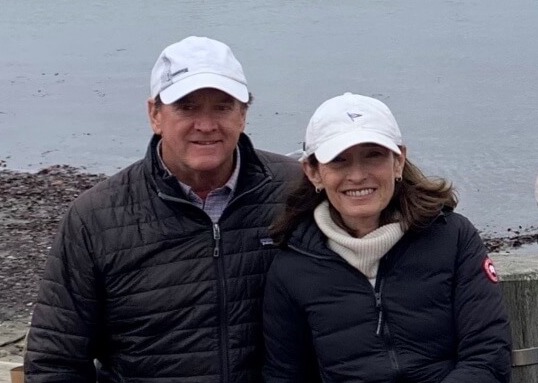The trip from Nantucket to Boston, involving a long drive and ferry ride, is an arduous four-hour journey (not counting summer traffic). But when Nantucket resident and retired educator, Claudia Kilvert, was diagnosed with breast cancer, she committed to regularly getting in the car with her husband and 80-pound golden retriever Luna to get treatment at Dana-Farber.
In December 2022, Kilvert initially came to Dana-Farber because of the Institute’s world-class reputation as a research and treatment center, she says. After her lumpectomy — which she received in addition to chemotherapy as prescribed by her breast oncologist Caroline Block, MD, and a course of radiation under the guidance of Jennifer Bellon, MD — she was given the option of receiving treatment closer to home. But she continued to make the trip in, and set up a short-term rental during her radiation, because of the support that she found through the Program for Older Adults with Breast Cancer (OABC).
“I pulled up the Dana-Farber website one day and saw the extra support and integrative therapies they offered and said, ‘I want this,’” Kilvert says.

A program tailored to older adults
The Program for OABC addresses the unique needs of older patients with breast cancer through a multidisciplinary approach that involves nutritionists, geriatricians, social workers, and integrative therapies like massage and acupuncture to improve care and treatment outcomes. Researchers involved in the program are also investigating optimal treatments for this demographic of breast cancer patients, who are currently underrepresented in clinical research even though breast cancer is most common in patients older than 70.
Kilvert believes that tailored support and investigation are important.
“Going through chemo is very different when you’re 70,” she observes. “Especially when you have other medical conditions.”
She has always been conscious about staying healthy. A little over a decade ago, she was diagnosed with celiac disease, an autoimmune disorder that makes people sensitive to gluten. With an already-limited diet, esophageal difficulties, concerns about how chemotherapy was affecting her, and the long travel distance, Kilvert turned to the Program for OABC for additional resources.
“It was all very overwhelming,” Kilvert remembers.
Patients with breast cancer at Dana-Farber Brigham Cancer Center and Dana-Farber – Chestnut Hill over 70 are approached by the program’s team, and patients in or near that age bracket are welcome to self-refer. Once connected through Kilvert’s oncologist, Dana-Farber program coordinator Sydney Simo quickly got to work connecting Kilvert with resources. There was a lot of coordinating to do, including figuring out travel, lodging while she received chemo and radiation, and Kilvert’s other medical concerns and appointments.
“Sydney was great because right away she stepped up and got me in touch with providers,” Kilvert says. “Even when I was feeling overwhelmed, she kept encouraging me.”
A team of specialists for your cancer
Through a combination of virtual and in-person meetings, Simo set Kilvert up with a dietitian, geriatrician, pharmacy specialist, and coordinated therapies at Dana-Farber’s Leonard P. Zakim Center for Integrative Therapies and Healthy Living.
During and after her treatment, Kilvert has been supported by Program for OABC Geriatrician Tammy Hshieh, MD, MPH. She has helped Kilvert to manage existing health issues like her esophageal disease and celiac disease, which could have complicated treatment. Co-management of her care by a geriatrician with an expertise in both oncology and aging helped make the treatment process much smoother. In particular, Kilvert felt comfortable discussing complementary alternative treatments and supplements, including acupuncture, to help optimize her treatment course.
Liz Puris, MS, RD, an oncology dietician at the Zakim Center, also cleared up Kilvert’s questions about what she could and couldn’t eat on chemotherapy. For example, Kilvert was told that she couldn’t eat mushrooms or fresh vegetables while she was undergoing chemotherapy. Puris clarified for her that they could be eaten if they were cooked and explained that the concern mainly stemmed from the bacteria and fungus that collect on these food items that might be dangerous to a compromised immune system.
Dana-Farber pharmacy specialist Amal Arnaout, PharmD, also joined Kilvert’s team to help manage her medications. Working together with Block and Hshieh, MD, MPH, Arnaout was able to make recommendations for medications that would alleviate Kilvert’s celiac and esophageal symptoms as well as her chemotherapy side effects.
Through the Program for OABC, Kilvert was also set up with regular acupuncture sessions and massages through the Zakim Center. The practices helped calm her before treatments and helped calm her fear of needles.
“I loved the fact that Sydney could set me up with someone right away,” she says. “I’d say, ‘Sydney, I don’t know what to do this information,’ and boom, right away a Zoom meeting was being set up. It made a big, big difference because I didn’t know how to coordinate all these issues I was facing. Having the support made it emotionally easier for me to deal with. I felt more in control and confident, my anxiety was lowered.”
For her part, Simo is thrilled by the success of Kilvert’s story. “It’s wonderful to know how powerful our program can be,” she says.
Kilvert’s treatment journey — which just recently ended after radiation — was as smooth as it could be thanks to the whole team around her. Now, she looks forward to uninterrupted time with Luna and her family in Nantucket, which includes a sister, niece, daughter, son, and husband. They can often be found taking long walks on Nantucket’s renowned beaches and are thrilled to be back on the water again, swimming, kayaking, sailing and paddle boarding with Luna.
